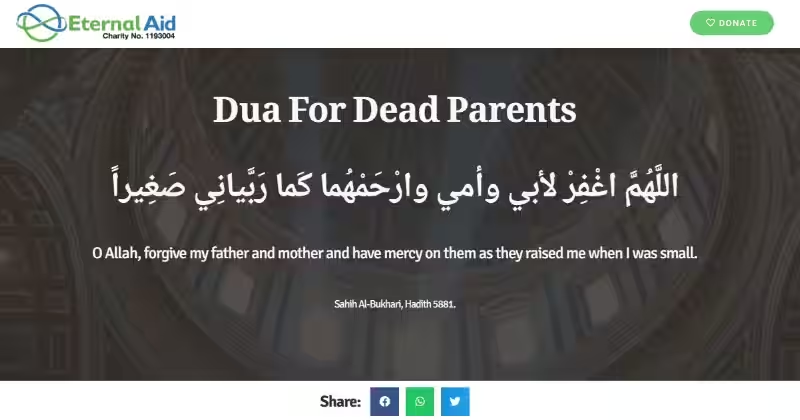
In the tapestry of Islamic faith, the concept of death holds a profound significance, intertwined with the belief in an eternal afterlife. While the physical body perishes, the soul continues its journey, facing divine judgment and the consequences of its earthly actions. Within this framework, supplication (dua) emerges as a powerful act of love, compassion, and faith, offering solace to the grieving and seeking blessings for the departed.
The Quran and Sunnah, the foundation of Islamic teachings, emphasize the importance of making dua for the deceased. Prophet Muhammad (peace be upon him) himself stressed the significance of these prayers, urging Muslims to seek Allah’s mercy and forgiveness for their loved ones who have passed away. These acts of supplication are not merely rituals; they are expressions of our profound belief in Allah’s boundless mercy and our deep love for those who have left this world.
Unveiling the Significance of Dua for the Dead
Making dua for the deceased is not a mere formality; it is an act of profound faith and compassion. It is a way to connect with the divine, seeking Allah’s mercy and blessings for the departed soul. These supplications are believed to offer comfort to the grieving families and provide spiritual support to the deceased in their journey to the afterlife.
The significance of dua for the dead is further amplified by the concept of shafa’at (intercession), which refers to the act of vouching for someone or pleading on their behalf. Muslims believe that those who have passed away can benefit from the prayers of the living. By making dua for the deceased, we are essentially seeking Allah’s mercy and blessings for them, hoping that He will grant them a place in Paradise.
Types of Duas for the Deceased
The range of duas for the deceased is vast, encompassing prayers for forgiveness, mercy, a peaceful resting place, guidance, and protection from the trials of the grave. Here are some of the most common and powerful supplications:
1. “O Allah, forgive him and have mercy on him.” (Arabic: “اللهم اغفر له وارحمه”)
This dua, a heartfelt plea for divine forgiveness and mercy, acknowledges the human fallibility of the deceased and seeks Allah’s grace upon their soul. It is a powerful expression of hope for their spiritual well-being in the afterlife.
2. “O Allah, make his grave a garden from the gardens of Paradise.” (Arabic: “اللهم اجعل قبره روضة من رياض الجنة”)
This dua seeks a peaceful and pleasant resting place for the deceased, envisioning their grave as a beautiful garden in Paradise. It reflects the desire to grant them comfort and ease in the hereafter.
3. “O Allah, protect him from the trial of the grave.” (Arabic: “اللهم قه فتنة القبر”)
The deceased, upon leaving this world, face the trials of the grave, a challenging experience that tests their faith. This dua seeks Allah’s protection and guidance for the departed soul, shielding them from these trials.
4. “O Allah, enter him into Paradise.” (Arabic: “اللهم أدخله الجنة”)
This direct plea for Allah’s mercy seeks to grant the deceased entrance into Paradise, the highest level of the afterlife. It expresses hope for their eternal happiness and reward for their good deeds.
5. “O Allah, expand his grave and fill it with light.” (Arabic: “اللهم وسع قبره وأدخله نوراً”)
This dua seeks to bring ease and light to the deceased’s resting place, envisioning their grave as a spacious and illuminated space. It reflects the belief that light symbolizes knowledge, guidance, and Allah’s mercy.
6. “O Allah, join him with the righteous.” (Arabic: “اللهم ألحقه بالصالحين”)
This prayer aims for the deceased to be united with the prophets, martyrs, and righteous in the hereafter, seeking their companionship and guidance in the afterlife.
7. “O Allah, grant me patience over my loss.” (Arabic: “اللهم آجرني في مصيبتي”)
This dua, specifically for the bereaved, seeks strength and patience from Allah to cope with the loss of a loved one. It recognizes the emotional toll of grief and seeks divine support during this difficult time.
8. “O Allah, replace my loss with something better.” (Arabic: “اللهم أجرني في مصيبتي واخلف لي خيراً منها”)
This dua, paraphrased from the teachings of Prophet Muhammad, asks for Allah to replace the loss with something better, whether it be in faith, love, or companionship. It expresses hope for a brighter future despite the pain of loss.
9. “O Allah, accept his good deeds.” (Arabic: “اللهم تقبل منه الصالحات”)
This prayer seeks Allah’s acceptance of all the good deeds performed by the deceased during their lifetime, recognizing their positive impact on the world and hoping for divine reward for their efforts.
10. “O Allah, protect him from punishment.” (Arabic: “اللهم عافه من العذاب”)
This supplication seeks Allah’s mercy and protection from punishment in the afterlife, acknowledging the potential consequences of sin and seeking divine forgiveness for the deceased.
The Power of Dua: A Beacon of Hope and Comfort
The act of making dua for the deceased is not merely a ritual; it is a powerful expression of love, faith, and compassion. These supplications are a testament to the belief in Allah’s mercy and our hope for the well-being of our loved ones in the afterlife. They offer comfort to the grieving and a reminder of the eternal connection we share with those who have passed away.
As we recite these duas, we are not simply uttering words; we are engaging in an act of profound faith, seeking divine intervention for the deceased and finding solace in the knowledge that our prayers can reach them even beyond the veil of death. These supplications are a testament to the enduring power of faith, reminding us that even in the face of loss, there is hope, mercy, and a connection to the divine that transcends the boundaries of this world.
Frequently Asked Questions About Dua for the Dead in Arabic
What is the meaning of “Allahummaghfir lahu warhamhu”?
“O Allah, forgive him and have mercy on him”
What is the meaning of “Allahumma a’jizhu fil jannati”?
“O Allah, grant him a high place in Paradise.”
What is the meaning of “Allahumma ajirni fi musibati”?
“O Allah, grant me patience in my grief.”
- Recite “Allahummaghfir lahu warhamhu” (O Allah, forgive him and have mercy on him) for seeking Allah’s boundless mercy and forgiveness for the deceased.
- Pray “Allahumma aj’al qabrahu rawdatan min riyadil jannati” (O Allah, make his grave a garden from the gardens of Paradise) for a peaceful and pleasant resting place.
- Seek “Allahumma qih fi-tanatal qabr” (O Allah, protect him from the trial of the grave) to shield the deceased from challenges after death.
- Plead “Allahumma adkhilhu al-jannah” (O Allah, enter him into Paradise) for the deceased to be granted entrance into Paradise.
- Pray “Allahumma wasi’ qabrahu wa adkhilhu nuuran” (O Allah, expand his grave and fill it with light) for ease and light in the deceased’s resting place.
- Request “Allahumma al-hiq-hu bis-saliheen” (O Allah, join him with the righteous) for the deceased to be united with the righteous in the hereafter.
- Seek “Allahumma ajirni fi musiibati” (O Allah, grant me patience over my loss) for strength and patience during grief.
- Pray “Allahumma khilf-hu fi khairan” (O Allah, replace him with something better) for a good replacement, whether in faith, love, or companionship.
- Supplicate “Allahumma taqabbal minhu al-salihat” (O Allah, accept his good deeds) for Allah’s acceptance of the deceased’s good deeds.
- Ask “Allahumma qih fi-tanatal qabr” (O Allah, protect him from the trial of the grave) for protection against punishment in the afterlife.







